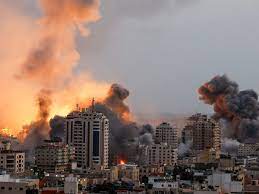The humanitarian and security situation in Palestine has become dire after the Israeli rogue Army made a record of brutality killing around 3,000 people including children, through continuous bombardment and air strikes on the Gaza Strip and the West Bank since October 7. According to the Palestinian health ministry, more than 12,500 Palestinians have been wounded since Israel started bombarding Gaza in retaliation for Hamas’s large-scale incursion into Israel. Israel has tightened its blockade on Gaza, including by restricting the entry of food, water and fuel and bombarding the area with air strikes that have killed thousands of Palestinians, displaced hundreds of thousands more and resulted in severe shortages of food, water and medical supplies. According to the United Nations’ World Food Programme, the food situation in the besieged Gaza Strip is running short, and a few days’ stocks have been left in the markets and Bazars. Meanwhile, Israel’s indiscriminate shelling and air strikes continue on civil targets including residential complexes, hospitals, markets, schools and other places being used as shelters by unarmed civilians. Israel has issued an ultimatum for more than 10 million Gazans to evacuate Southern Gaza before an impending ground attack launched by the Israeli military. An Israeli airstrike on a hospital on Tuesday killed more than 500 people including children, which amounts to no less than a war crime against innocent civilians.
Historically, the surprise attack by Hamas and brutal response by Israel have left the world aghast, as either side has used extreme measures and demonstrated resolute resistance against each other. A fresh and complex crisis has erupted in occupied Palestine, which will have wide-ranging consequences for the MENA region and the world at large. The tragedy is further compounded by fears of mass evacuation from Gaza, large-scale ground attack by Israeli troops, and safety of fleeing civilians, while a real risk of drawing regional foes into long-running conflict in the Middle East region remains all times high. Unfortunately, the UN Security Council (UNSC) whose sole task is the maintenance of global peace and security, has failed to achieve its one-point agenda, particularly in respect of the Palestine dispute. During its previous session, the 15-member body could not reach a consensus on a Russia-sponsored resolution while the forum is expected to decide on a second draft resolution shortly. A global diplomatic outreach of major nations including the United States, Russia, China, the UK, France, the Kingdom of Saudi Arabia, Turkey and Iran, Egypt is currently underway to control heightened hostility. A majority of nations have condemned the Hamas surprise attack, and also declared Israel’s inhumane actions against innocent civilians unlawful, a violation of the Geneva Convention that amounts to warcrimes against humanity.
Amid such devastations and heart-wrenching scenarios, the Biden administration has dispatched two aircraft carriers to the Middle East while thousands of US troops have been deployed in Southern Israel to deter any potential threat against the Jewish state. Amid such high-level military mobilization and mass economic and military assistance to Israel, the Biden administration has formed an air corridor between Washington and Tel Aviv to carry out shuttle diplomacy and smooth transition of solidarity trips by top US leadership including US Secretary of State, Secretary of Defense, Commander CENTCOM and others. Interestingly, the Biden administration was mulling over the prospects for President Biden’s visit to Israel and Jordan to offer his sincere support to the Israeli government and the public and to censure Palestinian President Mahmood Abbas for his inability to control Hamas during his short trip to Amman. After Israel’s brutal attack on a Hospital in Gaza, the Jordanian government has expressed its inability to welcome Biden at this point, which is a clear displeasure of Arab nations over US policies in the Middle East.
In fact, the recent Hamas-Israel conflict has exposed the fraughtness of the Middle East strategy of the successive US administrations including Republicans and Democrats which has been centered on expanding the Abraham Accord in favor of Israel and completely ignoring the Palestinian dimensions that caused various grievances among the Arab nations and prompted reaction from the Palestinian armed groups. Historically, the cabal of US strategists at the State Department, Pentagon and Langley along with scores of think tanks and foreign policy institutes failed to identify and comprehend genuine US interests in the Middle East and sabotaged the US diplomacy in blatant pursuit of Israel’s ambitious designs in that region. Presently, the situation in Palestine is worsening rapidly and the risk of the outbreak of a large-scale multinational conflict is very high. The global community and Western nations must employ serious efforts to reach an immediate ceasefire in Gaza before it gets too late and human disaster occurs in that region.







